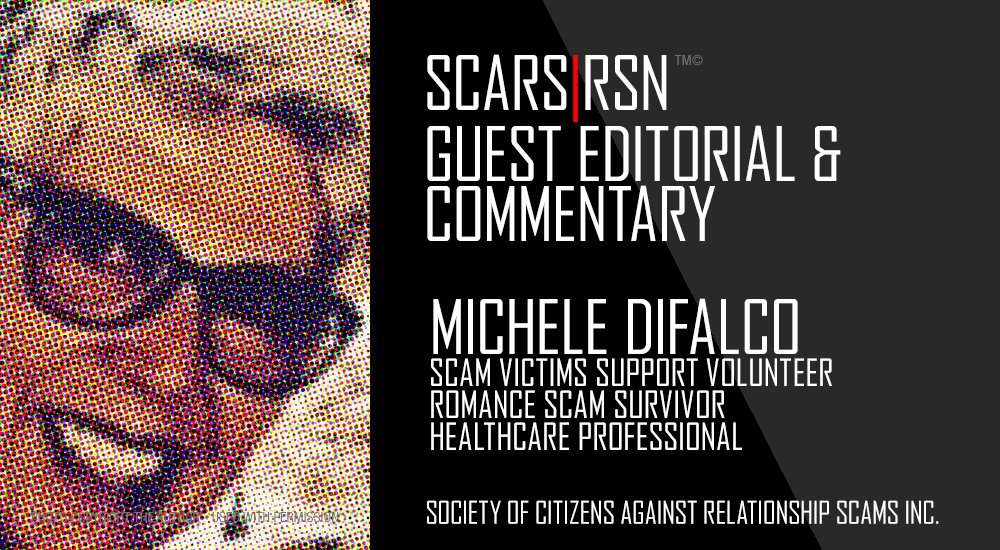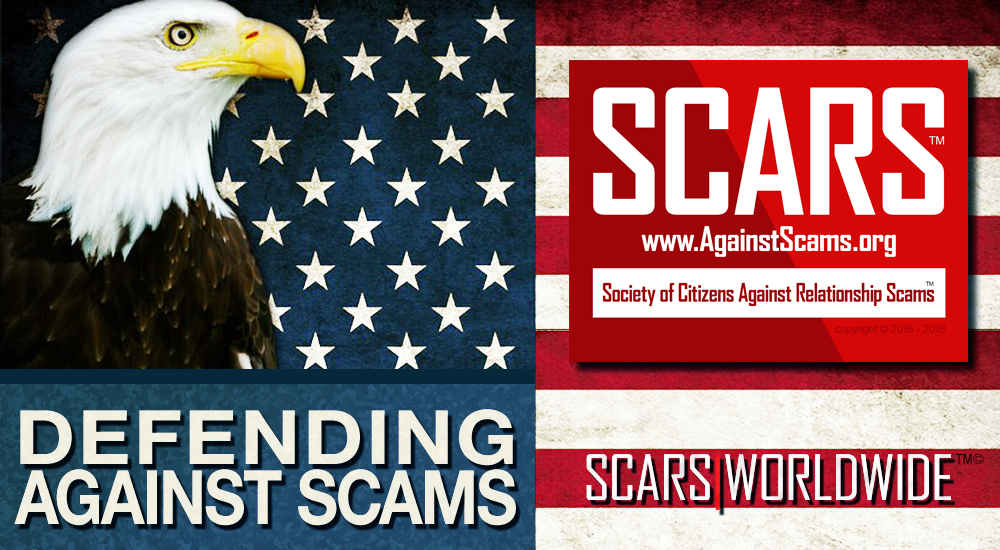A SCARS™ Guest Editorial By Michele Difalco
The following is a Guest Editorial by Michele Difalco – an Anti-Scam Victims’ Support Volunteer, Scam Survivor, and Healthcare Professional. Michelle plays an important role in directly helping scam victims to recover in Support Groups of the Society of Citizens Against Relationship Scams Inc.
Do Not Blame Yourself
Do Not Blame Yourself. The scammers appeal to our sense of trust and compassion!
They are experts at adjusting their scripts to appear legitimate, whether it be their forgeries, ID’s or bogus web pages, they all appear to be reliable official institutions or so called established reputable businesses.
We become “addicted” to the viceral triggers they set up to exploit our basic human desires and needs. We become powerless to our own reactions. They count on the triggers that make us focus on the drama that is “unique to them.” They also emphasise the urgency of their situation because this considerbly reduces our ability to process the scam content objectively even when we question their resources and situations
We developed a behavioral commitment. Without us knowing, the scammers ask their potential victims to make small steps of compliance and this drew us in.
In hindsight we can now see the disproportionate relation between the scammers keeping their promises and the cost of their promises coming to fruition.
We are led to focus on the future relationship and plans which makes the money we sent look rather small by comparison.
Did we develop a lack of emotional control. Yes.
That’s the psychological – social control that they exert over us. We became unduly open to their situation and their persuasion.
Our vulnerability was on overload . We were socially isolated, because of the nature of social networks we tended to regulate our emotions when we otherwise might not.
Now we are dealing with guilt.
A powerful emotion the scammers count on. No matter how powerful the pull, continue to ignore, block, delete and report the scammers. We were deliberately deceived, robbed emotionally and financially raped by these amoral creatures who have no regard for the damage they purposely incurred.
There are no physical signs of the abuse we endured. Yet we are scarred.
You are at no time at fault or to blame for this crime against you. The scam is designed to make the victim to feel self-blame.
The scammer is a criminal who is responsible for the cyber-crime.
Please do not feel stupid or guilty, put the blame where it belongs on the scammers! SCARS has continued to help me with education, support and fellowship that is needed to heal.
“Do the best you can until you know better. Then do better.”
Maya Angelou
Michele Difalco
New Jersey U.S.A.
Feel free to leave a comment for [author] or SCARS in the comments below!
ARE YOU AN AUTHOR? WOULD YOU LIKE TO SUBMIT ARTICLES TO BE PUBLISHED ON SCARS? CLICK HERE »
TAGS: Michele Difalco, Never Be Ashamed, Do Not Blame Yourself, No Self-Blame, Do Better,
END
– – –
Tell us about your experiences with Romance Scammers in our Scams Discussion Forum on Facebook »
– – –
FAQ: How Do You Properly Report Scammers?
It is essential that law enforcement knows about scams & scammers, even though there is nothing (in most cases) that they can do.
Always report scams involving money lost or where you received money to:
- Local Police – ask them to take an “informational” police report – say you need it for your insurance
- Your National Police or FBI (www.IC3.gov)
- The SCARS|CDN™ Cybercriminal Data Network – Worldwide Reporting Network HERE or on www.Anyscam.com
This helps your government understand the problem, and allows law enforcement to add scammers on watch lists worldwide.
– – –
Visit our NEW Main SCARS Facebook page for much more information about scams and online crime: www.facebook.com/SCARS.News.And.Information
To learn more about SCARS visit www.AgainstScams.org
Please be sure to report all scammers HERE or on www.Anyscam.com
All original content is Copyright © 1991 – 2020 SCARS All Rights Reserved Worldwide & Webwide – RSN/Romance Scams Now & SCARS/Society of Citizens Against Relationship Scams are all trademarks of Society of Citizens Against Relationship Scams Incorporated (formerly the Society of Citizens Against Romance Scams)
Legal Notices:
All original content is Copyright © 1991 – 2020 SCARS All Rights Reserved Worldwide & Webwide. Third-party copyrights acknowledge.
SCARS, RSN, Romance Scams Now, SCARS|GLOBAL, SCARS, Society of Citizens Against Relationship Scams, Society of Citizens Against Romance Scams, SCARS|ANYSCAM, Project Anyscam, Anyscam, SCARS|GOFCH, GOFCH, SCARS|CHINA, SCARS|CDN, SCARS Cybercriminal Data Network, Cobalt Alert, Scam Victims Support Group, are all trademarks of Society of Citizens Against Relationship Scams Incorporated.
Contact the law firm for the Society of Citizens Against Relationship Scams Incorporated by email at legal@AgainstScams.org






I was scammed by an American soldier named Mike Anthony bitner and now I cannot get a bank account because they say I defrauders them when I didn’t know what was going on I believed him when he said he was going to come over and meet me for three and half years I believed him he was arrested and kicked out of the army but I’m in a position where I can’t get a high street bank account I’m the victim here
We are sorry this happened to you. That is the risk of giving your banking information to someone you have never met. You may have to hire an attorney to resolve your issues. You should also speak with the local police to see if they have a victims advocate service to help you understand the options available in the UK.